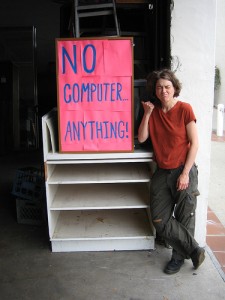
It’s 2013. Our modern Internet is now 24 years old, email is about 20 years old, folks have been blogging their personal lives and what they ate for breakfast for nearly as long, and the proliferation of social media has allowed us to share those meal pictures and stories for nearly 10 years. Roughly 80% of folks in the United States are online and in a variety of ways.
However, at the ripe old age of roughly 100 years, it seems that much of modern social work practice and education is not taking advantage of these tools and the opportunities they may afford to help our clients and ourselves. In fact, common advice given to social workers looking for technology best practices is to just ignore it entirely lest we commit any ethical breaches. It’s discouraging when social work acts like a clunky luddite dinosaur in the room. Honestly it makes me a little sad. I wish we could get to a point where we could accept and embrace technologies and their potential while being cognizant of risks involved and creating good policies around their use.
To that end, our chat this week will focus on discussing and debating the true ethical dilemma inherent in our ludditism. According to Perron, Taylor, Glass, and Margerum-Leys (2010), our collective technological ignorance is negatively affecting our social work practice and education in a way that is unethical towards our clients. The authors state:
Information and communication technologies (ICTs) are electronic tools used to convey, manipulate and store information. The exponential growth of Internet access and ICTs greatly influenced social, political, and economic processes in the United States, and worldwide. Regardless of the level of practice, ICTs will continue influencing the careers of social workers and the clients they serve. ICTs have received some attention in the social work literature and curriculum, but we argue that this level of attention is not adequate given their ubiquity, growth and influence, specifically as it relates to upholding social work ethics.
They offer many suggestions to improve the situation:
Significant attention is needed to help ensure social workers are responsive to the technological changes in the health care system, including the health care infrastructure and use of technology among clients. Social workers also need ICT competencies in order to effectively lead different types of social change initiatives or collaborate with professionals of other disciplines who are using ICTs as part of existing strategies.
The NASW has also published guidelines around ethical technology use in social work practice and education. Meanwhile, other folks have explored the ways in which the technology-enabled connections we make online can impact our relationships, both professional and personal. For example, Rainie and Wellman (2012) recently published their book Networked:The New Social Operating System which:
Show how the large, loosely knit social circles of networked individuals expand opportunities for learning, problem solving, decision making, and personal interaction. The new social operating system of “networked individualism” liberates us from the restrictions of tightly knit groups; it also requires us to develop networking skills and strategies, work on maintaining ties, and balance multiple overlapping networks.
Tiffany Shlain also explored implications for our technologically interconnected world. Social work practice and education could be greatly enhanced by using such networks to share resources, best practices, and connect to one another.
I assert the following:
- ICTs provide resources, avenues for education, and connections for practice
- In some cases, ICTs are the vehicle for practice. For example, there are many ways to use social media for advocacy.
- It is unethical not to use and explore best practices for clients and communities
- ICTs may have unintended consequences
- By remaining technology luddites, social work may be committing mass cultural incompetence
Questions for Discussion:
- How are your clients using ICTs?
- How are you using technology in your practice?
- How can we use technology better?
- What connections are we missing by keeping our practice and education offline?
- What ethical considerations do we need to consider when exploring and implementing ICTs in our work?
Join us and share your views and experiences regarding these and other relevant questions @SWSCmedia today at 8:00 PM EST / 5:00 PM PST. Look forward to seeing you there.
